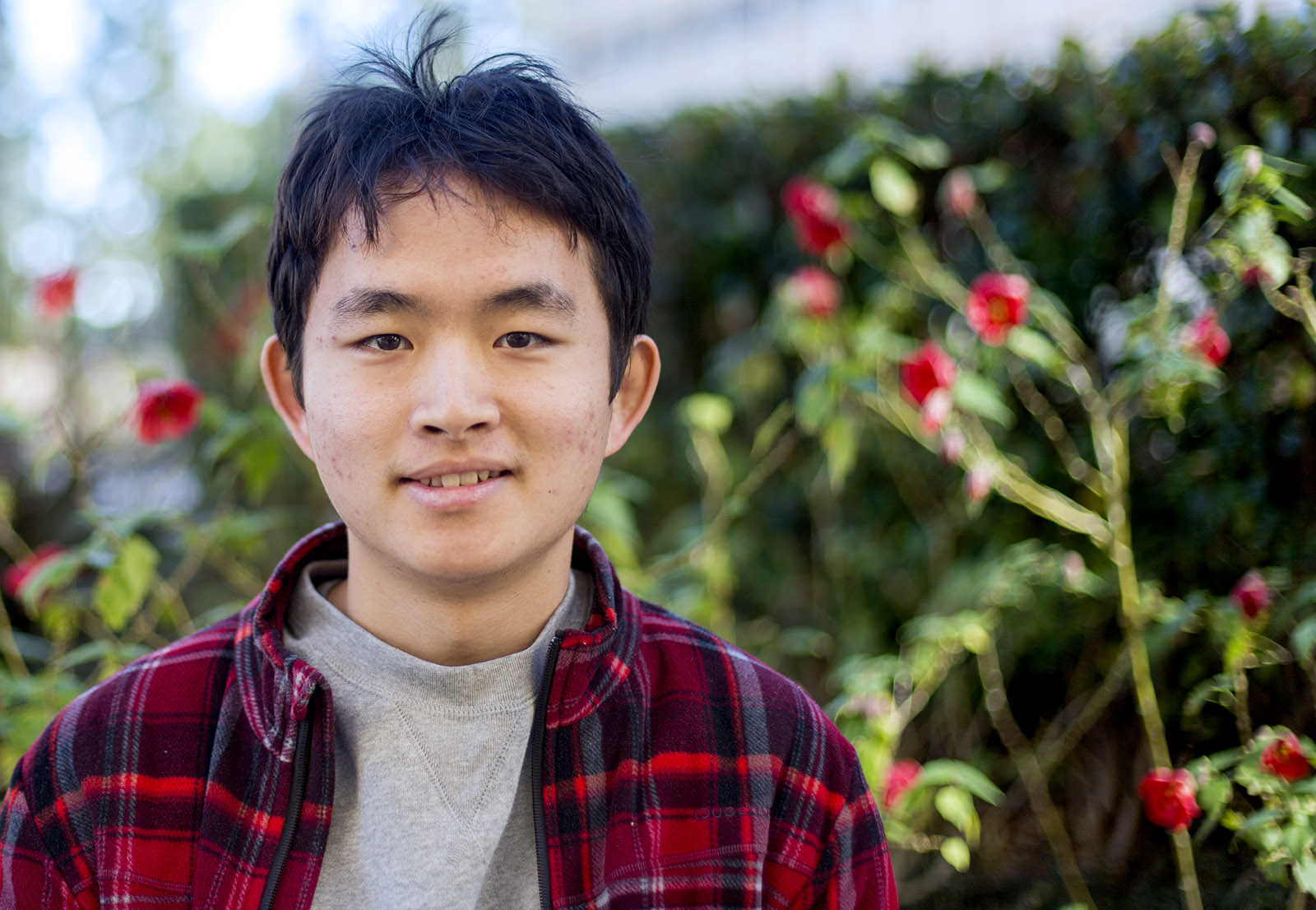Students strive to keep Lunar New Year spirit alive despite distances

First-year mathematics of computation student Henry Jian misses the Lunar New Year celebrations in his hometown of Hangzhou, China. Back home, he played with his cousins and lit fireworks for the New Year while his mother and other relatives made dumplings in their kitchen. Now, Jian celebrates with friends to keep the festive mood alive in college. (Keila Mayberry/Daily Bruin staff)
By Daily Bruin Staff
Feb. 9, 2016 12:31 a.m.
The lion costume, with its enormous beady eyes, large flapping face and writhing body, terrified Trixie Le when she was younger. It moved to the thumping of the drums and towered over the 5-year-old, who remembers bursting into tears.
“I thought they were real,” said Le, a first-year psychobiology student. “It was overwhelming.”
Now, Le said she thinks of the lion dance, part of Lunar New Year festivities, as a facet of her cultural heritage that she has continued to identify with at UCLA. The Lunar New Year, a 15-day festival celebrated in many Asian cultures, began Monday.
Tradition and family are central to the atmosphere of celebrations, Le said. At UCLA, however, many students who celebrate the Lunar New Year will be away from their homes and their families. Many will try to adapt their celebrations to the college environment, focusing on smaller celebrations with friends.

Despite attempting to simulate holiday celebrations in a college environment, for students like Desmond Lim, Henry Jian and Le, the Lunar New Year will not be the same.
Lim, a second-year geography student and social media chair of the Singaporean Students Association at UCLA, said there is a celebratory mood that is lacking.
“I don’t really feel the festivity over here,” Lim said.
In Singapore, Lunar New Year is a national holiday. Family members visit their relatives according to a specific visiting schedule. Stores have red decorations plastered to their front windows. Chinese music plays in the malls. Crowds of people line the streets.
“People are dedicated to putting in effort just to celebrate,” Lim said. “It is part of our national identity.”
The Lunar New Year, Le and Lim said, is typically associated with traditional and more conspicuous superstitions and symbols, but the spirit of the festival is encapsulated in the family, a tradition that is difficult to emulate away from home.
Jian, a first-year mathematics of computation student, remembers his parents and grandparents making dumplings in the kitchen of his home in Hangzhou, China. He and his cousins would go outside to play with firecrackers while they were preparing the food. When the meal was ready, the family would come together and eat.
The critical part is not the food itself, Jian said, but bonding with family and sharing stories of the events of the past year.
While away from family and their hometown festivities, Jian and many students have adapted the celebrations from reconnecting with family to sharing meaningful experiences with friends.
Jian planned to go to a friend’s house to cook dinner, which involved microwaving pre-packaged dumplings. Since many ingredients, such as pork belly, cannot easily be found in Westwood, Jian said dumplings were too difficult to make at college.
“I will have to go really far away to a Chinese market to buy (the ingredients),” Jian said.
Jian made up for the lack of traditional food by focusing on creating a communal atmosphere. On Sunday, he sat around the TV with friends and watched some of the China Central Television’s Spring Festival Gala program.

Lim said he is finding ways to celebrate in the Los Angeles community. The UCLA Singaporean Students Association at UCLA organizes an annual Chinese New Year dinner with its USC counterpart, booking a Chinese restaurant together and trying to reach out to other Singaporeans in college communities.
This year, the clubs hosted the event at the Atlantic Seafood Restaurant in Monterey Park Saturday, which Lim said added a personal level of festivity to the dinner.
“There’s just a sense of belonging that emerges when you talk about what you normally do back home,” Lim said.
Le said Tet, the Vietnamese New Year, will be a casual celebratory experience with friends.
“Maybe me and one of my friends will check out some festival right after my midterms. It’s just going to be a touristy thing,” Le said. “(It won’t be) really serious.”
Even though celebrating at UCLA will be different from celebrating with family back home in San Jose, Le still feels the same love for the new year that she felt when she was five.
One thing, however, has changed: She is no longer afraid of lion dancing. She has learned to appreciate the cultural traditions, and the importance of celebrations for her family and her community.
“I was small. I didn’t really know what was happening, and I didn’t really understand the culture. I was kind of just there,” Le said. “Now, I look at the lion dancers and I understand the meaning behind the lions. I understand how important this celebration is to our culture.”


